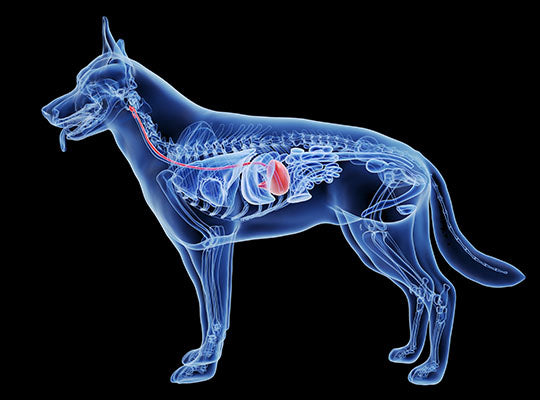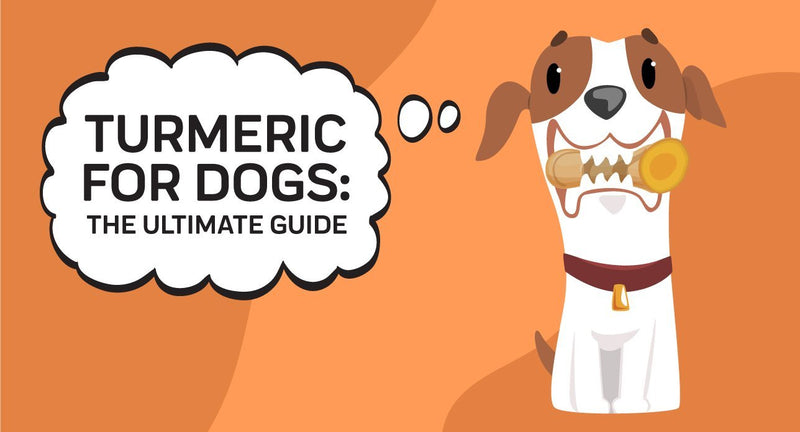From time to time, an upset stomach isn't much of a concerning thing. We all experience moments when we may have eaten something that doesn't agree with us, or our stomach just isn't up to the usual tasks. The same thing can happen to our pets!
However, when your dog seems to be experiencing stomach upset often it may be time to get them checked out by a vet. That way, you can get a closer look at the options and medications available to you to control nausea. One medication commonly prescribed is known as Metoclopramide, and it's worth having an in-depth understanding of it!
What Is Metoclopramide For Dogs?
While Metoclopramide is typically prescribed for humans, vets may also choose to prescribe it to treat nausea in dogs and cats as well. Typically, it is meant to treat gastrointestinal upset. It's a useful drug for dealing with things like nausea, reflux, and vomiting that can result from illnesses.
Metoclopramide can also be known as Octamide, Maxolon, Clopamon tablets and Reglan. Uses for these medications are all very similar, but may have some slightly different effects. Understanding the side effects of Reglan or any other similar medications is a good idea.
What Does Metoclopramide Do?
There is a variety of Metoclopramide uses, including helping with getting the stomach emptied, treating migraine headaches, gastroesophageal reflux illnesses, nausea, and vomiting in otherwise healthy pets. In some pets, Metoclopramide can be used for assisting with hairballs or food that isn't moving along, as well as helping with cancer treatment symptoms.
In humans and some animals, Metoclopramide can promote milk production and induce milk let down.
Metoclopramide For Dogs Doses
When your vet prescribes Metoclopramide for your pet, it's important to make sure their administration instructions are followed completely. Doses that are incorrect can cause complications, overdoses or simply not treat the illness as well as it should.
Your vet will provide you with the correct dosage for your dog. If they manage to consume too much, let your vet know right away so that they can provide a course of action. It's also a good idea to let the vet know if your dog's condition becomes worse or doesn't appear to change after taking the medication.
Finally, contact your vet if a dose is missed. Typically, you can simply provide the dose if it was only missed by a shorter period of time but it's best to get the exact instructions from your vet, in order to ensure the best results for your dog.
Metoclopramide for cats is also an option if your cat experiences digestive stress, however it's important that you first check with a vet about the cause as giving Metoclopramide may worsen the condition. If you think your cat can benefit from this medication, ensure you consult a vet about it and obtain the correct dosage for your pet.
How Does Metoclopramide Work?
As a receptor antagonist, Metoclopramide blocks areas in the central nervous system from receiving certain kinds of stimuli. As a result, it can keep dogs from vomiting or becoming nauseous. In turn, this can help them to maintain their strength by digesting food and water rather than expelling it. Metoclopramide normalizes stomach contractions and may work in normalizing stomach motility to provide relief from colon motility disorder.
Metoclopramide for dogs does cross the blood brain barrier. This means that it may not be a good fit for pregnant dogs and cats.
Metoclopramide Benefits For Dogs
Metoclopramide is a medication that can assist with a variety of issues, including those that include a lack of movement ability within their stomach. As you might imagine, food in the stomach can become trapped and unable to travel properly, making your dog feel ill. Metoclopramide for dogs works by passing the blood brain barrier to normalize your pet's upper digestive tract and control nausea.
When you use Metoclopramide for issues like this, it can help to get the stomach moving again and allow food to get where it needs to go. As a result, dogs can get over nausea and the need to vomit more easily with their prescription medication.
The following benefits can also come from using Metoclopramide for dogs:
- Assistance with illnesses that result in issues with gastric emptying, hepatic failure, cancer, gastritis, renal failure, hepatitis and more.
- Prevention of acid backup
- Preventing nausea and vomiting due to chemotherapy treatment
Does My Dog Need Metoclopramide?
There is no denying that Metoclopramide can be a useful tool in dealing with issues like nausea, vomiting and other related symptoms.
However, it's important to keep in mind what this medication is used for – treating symptoms. That isn't typically too much of an issue when your pet only needs it for a short-term situation, but it's worthwhile to locate the source of the issue if your dog is having frequent or re-occurring digestion issues.
Metoclopramide Side Effects
You may notice a variety of different side effects in your pet while using Metoclopramide.
Common side effects can include the following:
- Restlessness
- Constipation
- Anxiety
- Confusion
- Diarrhea
- Drowsiness
- Retention of fluids
- Increased urination
- Nausea
- Movements that seem involuntary
- Hyperactivity
- Abdominal discomfort
- Changes in behavior
- Dizziness
- Heightened risk of seizures
- Sedation
- Dystonic reactions
- Dangerously high blood pressure
- Acid reflux
Make sure to consider these side effects carefully when Metoclopramide is provided as an option for your dog. If you notice side effects that seem particularly serious, make sure to get in touch with your vet immediately. They may prescribe your dog some other anti nausea drug.
Furthermore, it's a good idea to make sure your vet is aware of the following conditions before giving the medication to your dog:
- Pheochromocytoma
- Digestive obstructions, perforations, or hemorrhaging
- Allergic reactions to this or similar medications
- Dogs that are nursing or pregnant
- Epilepsy
- Kidney disease
- Diabetes
- High blood pressure
- Recent digestive region surgery
There are also a variety of other medications that can interact poorly with Metoclopramide, so make sure that your vet is aware of every medication, supplement, and even flea medication that your pet currently uses.
Metoclopramide Adverse Reactions And Overdoses
Just like many other medications, pets can have an adverse reaction or experience overdoses with this medication. Understanding the symptoms of each can help to keep your dog safe.
The following adverse effects can represent an allergic reaction in your dog:
- Facial swelling, or that in the tongue or lips
- Bodily spasms your pet cannot control
- Agitation
- Depression
- Seizures
- Problems with breathing
- Hives
- Anxiety
- Insomnia
- Eye or skin yellowing
Symptoms of an overdose can include:
- Confusion
- Irritability
- Tremors
- Agitation
- Drowsiness
- Neck spasms
- Face, legs or tongue movement not controlled by your dog
If you notice any of these symptoms, it's wise to contact your vet right away so that they can provide you instructions on how to best help your dog and treat upper GI tract symptoms. In some cases, metoclopramide for dogs can cause a rare adrenal tumor. Understanding the possible side effects that might be different is a good idea. Talk to your vet about all of the different anti-nausea medication options.
It's also worth noting that similar medications like Reglan that cross the blood brain barrier can produce side effects and adverse effects that are similar to Metoclopramide for dogs. Some of the dogs treated with metoclopramide for gastric motility disorders in the upper digestive tract or for acid reflux may take other prescription medications with similar side effects and as few limitations.
Drug Interactions Metoclopramide
Like other cholinergic drugs, there are some drug interactions that you should be on the look out for with your dogs and cats. Often, motility disorder extends to other issues with the digestive tract. Ask your vet what symptoms to look out for that might signal that something is wrong with your dogs and cats.
Seizure prone users should not take metoclopramide for upper GI tract disorders, motility disorders, or other conditions, as it can make seizures worse. The drug's profile enables epileptic symptoms. Ensure your pharmacists provide accurate form labels with the warnings and other medications to avoid when taking metoclopramide for dogs, as the background process and interactions can impact the effectiveness of the medication.
Is Metoclopramide Safe?
Generally, Metoclopramide is determined to be quite safe, when used as directed to treat conditions of the upper GI tract. However, it is worth keeping in mind that both short term and long term side effects can occur and they can sometimes become serious.
One aspect that can help in easing concerns with safety is that it is Metoclopramide for dogs needs to be prescribed by a vet, and typically they will have a more informed view of your dog and their specific situation.
It's also going to be important to watch out for overdoses or allergic reactions, and to contact the vet immediately if you notice any signs of them. Remember to gain as much information about the medication as you can in order to feel safe providing it to your pet.
Tips For Using Metoclopramide
Naturally, you should always follow the instructions your vet gives you first and foremost. If those instructions are different from the tips listed here, make sure to favor what your vet tells you.
Aside from that, the following tips can help you to keep your dog safe and allow the Metoclopramide for dogs to be effective:
- Provide the medication about half an hour prior to a meal
- Follow the instructions provided with the medication carefully
- Avoid ceasing medication or skipping doses unless your vet specifically tells you to do so
- Provide doses daily, at the same time
- Give your pet water with each dose
- If you need a refill, make sure to call ahead
Natural Nausea Treatments
If the nausea your dog is experiencing isn't too intense or too frequent, then you can sometimes turn to a simple natural treatment to provide them some comfort. Keep in mind that these typically work best when there isn't a serious underlying issue causing the discomfort.
- Kefir - Small amounts of Kefir can also help to bring your dog's digestive system back to regular strength. This is also an option you can use regularly to help with maintenance of that system. Furthermore, it's an option that you can choose to make yourself if you choose.
- Baking Soda - This is one of the simplest options you can start with. The bubbles created by a combination of water and baking soda can assist with nausea and bloating. All this remedy takes is about a half of a cup of water and a teaspoon of baking soda.
- Peppermint - A peppermint tincture can be a useful tool in not only easing your dog's stomach problems but also freshening up their breath. You can use it to make a diluted peppermint tea for your dog quite easily.

CBD For Dogs
Another option that can be helpful in a number of ways is CBD. For everything from nausea to anxiety and even epilepsy, this natural product is an easy one to provide and it comes with many benefits. Make sure to discuss this option with your vet!
CBD For Dog Nausea
CBD can be a useful tool for nausea. It addresses inflammation in the body and helps to calm your dog down, which can give them an easier time handling stomach upset. In addition, it's something many use to help with keeping their appetite up, which is important for keeping your dog strong.
Because of these abilities, it can help with the odd bout of nausea, or nausea that is related to other medications or chemotherapy treatment. Many also enjoy that this option is one with few side effects, so there are much lower chances of things like kidney or liver damage.
Top CBD Products
Not just any CBD product will do. Most of us want the best for our pets, and we want to avoid options that may have any likelihood of having ill effects on our pet's health. This is especially true when we're looking for these products to help with health issues they are already experiencing.
Consequently, it's so important to obtain high-quality, organic CBD products. That way, you can be assured that your pet gets only the benefits of the CBD while avoiding any other effects that may be caused by chemicals used on or near the hemp plants that it comes from.
CBD Oil
There are many pet owners out there who favor CBD oil for dogs because of the versatility it provides. It's an option you can provide to other pets as well as dogs, and the liquid form means that they don't have an easy time spitting it out if they don't like the taste. You can also mix the CBD oil into their food or water for an even easier method of ensuring they get the health benefits they need. For those with pets of different sizes, there are different “levels”, or concentrations of CBD oil to make sure that each pet gets the dose that they need.
CBD Treats
For those who are looking to keep it simple, CBD dog treats are another easy choice. While they don't work as well for other types of pets, they do come in flavors that dogs tend to love. With options like maple bacon and berry, sweet potato and salmon, and cheese and steak, your dog is sure to feel like royalty when they are given these treats. At the same time, you'll know that your dog is getting some truly great benefits from the CBD, which can help to keep them feeling great in a number of different ways. Whether you have an older dog with arthritis, a younger dog with anxiety, or a perfectly healthy dog, they can all benefit from these products.
Metoclopramide For Dogs: The Bottom Line
We don't like for our pets to have digestive distress any more than we enjoy having it ourselves. Because of that, it's nice to know that there are options out there, both natural and prescribed, that can help your dog to feel better and keep food going where it needs to.
When it comes to using such medications, it's important to know as much as you can about how it helps, what side effects can occur, and what an overdose looks like. Armed with that knowledge, you'll have a much easier time making the best possible choices for the health of your pet.
Sources:
Metoclopramide
Metoclopramide (Reglan)
Metoclopramide
Gastrointestinal Prokinetic Drugs
Anti-Nausea Effects and Pharmokinetics of Ondansetron, Maropitant, and Metoclopramide
Approved by:
Dr. Ivana Vukasinovic
Doctor of Veterinary Medicine, University of Belgrade
 Ivana Vukasinovic grew up in Serbia and attended the University of Belgrade where she received a degree in Veterinary medicine in 2012 and later completed surgical residency working mostly with livestock. Her first year of practice was split between busy small animal practice and emergency clinic, and after two more years of treating many different species of animals, she opened her own veterinary pharmacy where an interest in canine and feline nutrition emerged with an accent on fighting animal obesity. In her free time, she acts as a foster parent for stray animals before their adoption, likes to read SF books and making salted caramel cookies.
Ivana Vukasinovic grew up in Serbia and attended the University of Belgrade where she received a degree in Veterinary medicine in 2012 and later completed surgical residency working mostly with livestock. Her first year of practice was split between busy small animal practice and emergency clinic, and after two more years of treating many different species of animals, she opened her own veterinary pharmacy where an interest in canine and feline nutrition emerged with an accent on fighting animal obesity. In her free time, she acts as a foster parent for stray animals before their adoption, likes to read SF books and making salted caramel cookies.
Thanks for stopping by!
P.S. We Love You!
Sincerely,
The Innovet Team
Please do not ask for emergency or specific medical questions about your pets in the comments. Innovet Pet Products is unable to provide you with specific medical advice or counseling. A detailed physical exam, patient history, and an established veterinarian are required to provide specific medical advice. If you are worried that your pet requires emergency attention or if you have specific medical questions related to your pet’s current or chronic health conditions, please contact or visit your local/preferred veterinarian, an animal-specific poison control hotline, or your local emergency veterinary care center.
Please share your experiences and stories, your opinions and feedback about this blog, or what you've learned that you'd like to share with others.


















